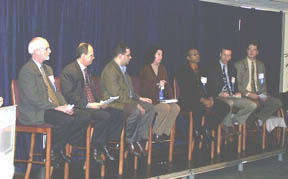An impressive array of city and business leadership gathered Wednesday in Suite 1601 of the Wells Fargo Building to discuss how aggressive marketing and public relations have put Tacoma on the map and what can be done to maintain the economic development and growth of the past several years.
They were on hand for a panel discussion, Why Tacoma may be the Center of the Marketing Universe, an event sponsored by The American Marketing Association, the Media Center for Tacoma-Pierce County and Text 100 International.
Moderated by KOMO 4 weekend anchor Molly Shen, the panel included: David Graybill, president and CEO, Tacoma-Pierce County Chamber; Bruce Kendall, president and CEO, Economic Development Board for Tacoma-Pierce County; Ballu Khan, founder and CEO of TUI Consulting, Inc.; Glen McNeil, senior director of engineering, SAGEM Morpho (he replaced Tom Larson, vice president of strategic development, SAGEM Morpho, who was originally scheduled); Chris Phillips, public relations manager, Frank Russell Co.; Mitch Robinson, marketing manager, Expedia, Inc.; and Juli Wilkerson, director, Tacoma Economic Development Department.
Panelists were unanimous in their belief that, for a variety of reasons, the perception people have of Tacoma has changed for the better.
Tacoma has emerged from Seattles shadow, Graybill said, adding the nature of media coverage has been more positive in recent years as the city has experienced an economic and cultural renaissance.
Phillips agreed: Tacomas identity is beginning to stand on its own.
This identity change can be attributed to Tacomas thriving community, a confluence of several factors, including economic, geographical and cultural reasons.
Several panelists praised the cooperation between the city and the business community – something not found in all cities – saying that has produced a better product that is luring businesses to Tacoma and Pierce County.
The public and private sectors working in concert is unusual, Graybill stated, noting such a partnership means ideas and products are thought through before being marketed.
Performance before publicity, Wilkerson said.
We have such an awesome business community that theyre our best marketers, she explained.
Wilkerson highlighted Tacomas well-received and successful Wired City advertising campaign, which focused on the citys business advantages, including an 8-week guaranteed permitting process and less traffic congestion than the Seattle metro area.
The perception of Tacoma as a technology-savvy city- Americas #1 Wired City – has paid off.
Tacoma has set the new benchmark in the world in terms of high-tech infrastructure, said Khan, who moved his companys global headquarters from Melbourne, Australia to Tacoma.
Probably the biggest thing we market…is the broadband availability… Kendall remarked.
Tacomas location on the West Coast, Phillips said, is also advantageous, in terms of the area being a center of international trade.
The citys livability is another factor that has helped draw more people to the area.
One of the major considerations was is this a livable city for our staff? said Khan, adding the areas geography reminded him of Australia and New Zealand.
I live here. Come check things out! said Robinson, who works in Bellevue, describing colleagues who dont live in Tacoma as jealous.
And there is plenty to check out, with the citys higher profile cultural growth, including the Museum of Glass, which opened last year and the new Tacoma Art Museum, scheduled to open this spring.
Other museums opening in the future include the LeMay car museum and Pioneer motorcycle museum.
As for the future, panelists said the city resting on its laurels was not an option, lest the hard-won gains of the last several years be lost.
There must be a marriage of old and new economies, Graybill said, referring to Tacoma moving from an industrially-based economy to a technology-based economy.
The local economy can grow, he said, especially in the area of export-oriented businesses, although such companies will have to become more technologically sophisticated.
We must diversify out of the old industrial base.





